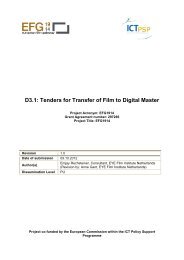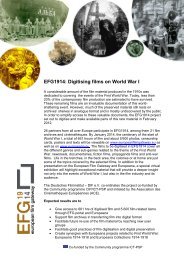XI MAGIS Gorizia International Film Studies Spring School ...
XI MAGIS Gorizia International Film Studies Spring School ...
XI MAGIS Gorizia International Film Studies Spring School ...
- No tags were found...
You also want an ePaper? Increase the reach of your titles
YUMPU automatically turns print PDFs into web optimized ePapers that Google loves.
Who’s What? Intellectual Property in the Digital EraUdine, March 12-14XX Udine <strong>International</strong> <strong>Film</strong> <strong>Studies</strong> ConferenceThe recent transformations in media landscape, determined by the digital revolution and the birthof Web 2.0, have brought the issue of intellectual property to the attention of jurists, consumersand, in a much wider sense, stakeholders.Due to the unprecedented proliferation of media platforms, the circulation of audio-visualproducts has become increasingly difficult to control, consequently undermining the usualstrategies of copyright protection and ownership preservation. Besides, as a matter of fact, theemergence of a new digital “sharing culture” – sustained by peer-to-peer communities, socialnetworks and the contemporary “gift economy” – has determined a radical change in the generalperception of intellectual property itself. Within this networked society, the nature of intellectualproperty has become more and more ambiguous, paving the way to the rise of renewed formsof users creativity, partially grounded on the grassroots re-appropriation and re-distribution ofpre-existing (licensed) materials (as in the case of the so-called fan fiction, for instance). As aconsequence, the question of intellectual property in the digital era is at the very centre of thepublic debate and has also begun to draw the attention of scholars and researchers. Nevertheless,film and media studies are not new to the investigation of such an issue which, on the contrary,has been extensively discussed during the history of cinema and moving images technologies.Mindful of these assumptions – and in line with its traditional interest in the interplay betweenearly cinema practices and contemporary developments –, the XX Udine <strong>International</strong> <strong>Film</strong><strong>Studies</strong> Conference would like to suggest the following research perspectives:The original and the copy. The digital “existence” of audio-visual products has brought intoquestion this (already problematic) opposition. The consequences of this new situation, in fact,involve both the practices of production and the distributive ones. In this sense, piracy appearsto be related more to this drastic change in the status of the “oeuvre” than to disobedience(either individual or organized).Copyright. Are the traditional forms of copyright protection appropriate for the new digitalenvironment in which audio-visual products circulate? Or are they just remnants of out-dated socialand legal practices? A historical overview of the copyright institution can help us to understand itsbasis and reasons, without taking for granted its existence as a sort of “natural right”.




